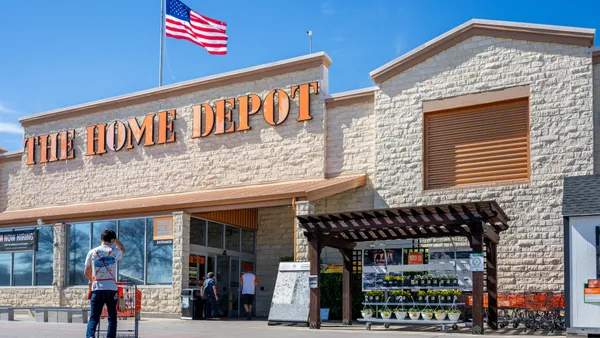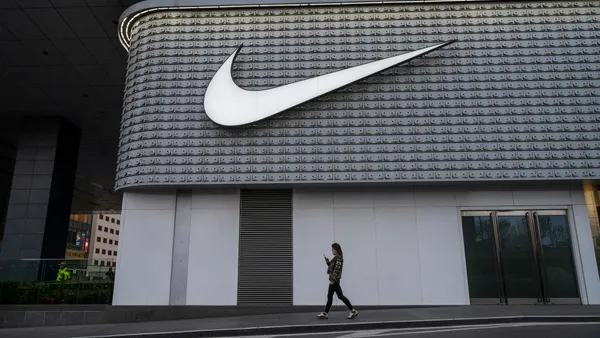Dive Brief:
- Best Buy incurred $169 million of fourth-quarter restructuring charges related to employee layoffs, the company said Thursday. The restructuring is intended to “right-size resources to better align with the company’s revenue outlook for FY25,” among other goals. The company declined to confirm to Retail Dive how many people were affected by layoffs.
- Best Buy’s fourth-quarter revenue was flat, falling less than 1% to $14.6 billion, and comparable sales declined nearly 5% for the holiday quarter, the company said in an Thursday earnings announcement. Domestic revenue was also flat at $13.4 billion, with U.S. comps declining 5% in Q4. Net earnings declined 7% to $460 million from $495 million a year ago.
- For the full year, Best Buy posted $43.5 billion in revenue, a 6% year-over-year decline. Operating income also fell 12% to $1.6 billion, while net earnings also declined 12.5% to $1.2 billion from $1.4 billion. Best Buy’s guidance for FY 25 anticipates revenue ranging from $41.3 billion to $42.6 billion with comparable sales declining 3% to flat.
Dive Insight:
Best Buy said it expects approximately $10 million to $30 million of additional restructuring-related charges in FY 25 and that it will pay up to $135 million of the employee termination benefits this fiscal year, with the remainder being paid in the next budget year.
When asked whether the company could provide additional details of terminations, a spokesperson in an email referenced a statement from CEO Corie Barry who referenced the restructuring in the call.
"While we made these decisions during the fourth quarter, which resulted in a restructuring charge many of the actions will be implemented through the first half of FY25 and we will provide more details as we move through the year."
Best Buy declined to provide any further comment regarding the terminations.
Best Buy’s Q4 results slightly beat top and bottom line forecasts, Wedbush analysts led by Seth Basham said in a Friday note. However, first-quarter and full-year guidance is “modestly below consensus,” Basham said.
The consumer electronics segment faced pressure throughout the year, Barry said during the earnings call. Although sales fell below expectations, the company grew its paid membership base and drove customer experience improvements in services and delivery. Best Buy’s comparable online sales fell nearly 5% in Q4. As a percentage of total domestic revenue, online revenue was flat at 38%.
“Over the final quarter, the market was soft but Best Buy underperformed it and lost share,” Neil Saunders, managing director of GlobalData, said in emailed comments. “This was especially so in appliances where retailers like Home Depot performed much better, and in consumer electronics and computing where players like Apple and Amazon are outperforming.
Macroeconomic conditions continue to pressure retail and the consumer electronics segment in particular, Barry said on the call. While inflation has slowed, prices for essentials like food and housing remain high. Still, “we remain confident that our industry will grow again after two years of decline,” Barry said. “This is simply a matter of the timing.”
Wedbush analyst Basham echoed that sentiment. “There are building signs of stabilization in consumer electronics, with laptop and TV unit sales again increasing for [Best Buy] in 4Q24, and replacement and innovation cycles likely to build from here,” Basham said.
The company said its capital investments for the current fiscal year will be focused on existing store updates and less on new stores or major remodels. “We plan to touch every single store in the chain in some fashion, improving both our merchandising and ease of shopping for customers,” Barry said. Saunders said the company’s focus on improving the in-store experience is rightly placed.
Best Buy said in January it plans to partner with Bell Canada to operate 165 small-format electronics stores. Those Best Buy Express stores will offer consumer electronics alongside phone, internet and TV services. The express locations are expected to open during the second half of this year. As part of the company’s efforts to adjust its store fleet, Chief Financial Officer Matt Bilunas said Thursday that the company closed 24 stores during the last fiscal year and it expects to close 10 to 15 more this year.
Barry said Best Buy also sees growth ahead as it advances into healthcare. “While still very small in relation to our core business, our fiscal 2025 Best Buy Health sales are expected to grow faster than the core business, which combined with cost synergies from fully integrating acquired companies are expected to drive another 10 basis points of enterprise operating income rate expansion.
“Customer shopping behavior has evolved in the last four years. And this year we are particularly focused on ensuring we provide the experience that customers expect to have when they take the time to come into our stores,” Barry said.














